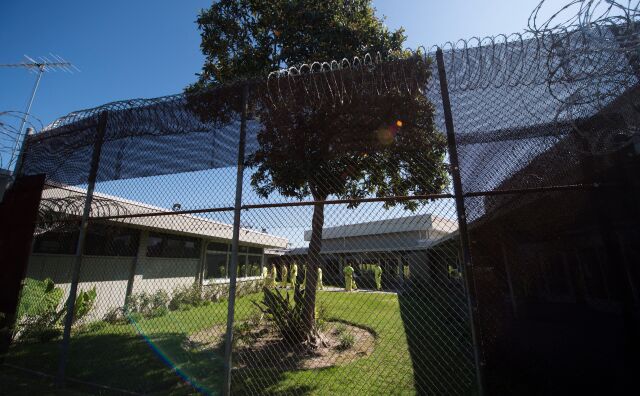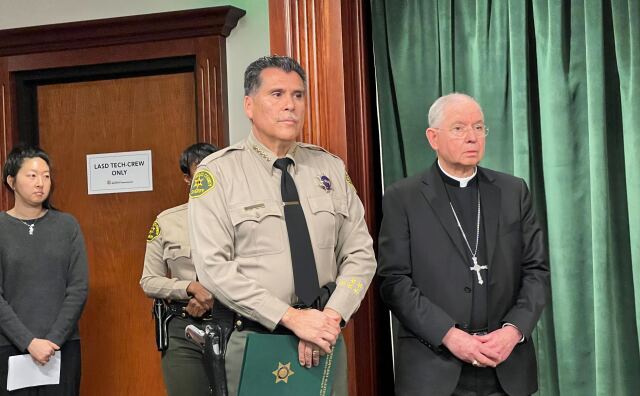Another Year Passes Without The Promised Closure Of ‘Crumbling’ Men’s Central Jail

It’s been exactly two years since the L.A. County Board of Supervisors received a 145-page proposal to close the aging Men’s Central Jail (MCJ).
Prepared by a work group led by the County Office of Diversion and Reentry and the Sheriff’s Department, in partnership with community groups and service providers, the report offered a three-pronged strategy for shutting down the 60-year-old, "unsafe, crowded and crumbling" jail:
- Redistribute the MCJ population to other jails;
- Invest “significantly” in beds and services within the community;
- Divert some 4,500 people with mental health issues out of jail (roughly the number of people being held at MCJ).
The proposal said it would require a large investment in expanded community mental health and substance use services before L.A. County will be able to close the jail. The report authors also estimated that it would take up to two years to get it done.

“The board needs to commit to a deadline. People are suffering and dying. And so we say to the Board of Supervisors ... give us a date and we will do everything in our power to help you meet it,” said Melissa Camacho-Cheung, senior staff attorney with the ACLU of Southern California, in front of the Kenneth Hahn Hall of Administration Thursday.
Activists with the group JusticeLA are demanding county supervisors take the following actions based on the MCJ closure report:
- Commit to closing MCJ without a replacement by March 2025.
- Downsize the jail population to 8,500.
- Immediately allocate $237M to produce 3,600 additional mental health beds in the next six months.
- Cut the pretrial population to less than 1,000 using a decentralized system of care, not probation.
-
At magnitude 7.2, buildings collapsed
-
Now spinning in front of Santa Monica apartments
-
Advocates seek end to new LAUSD location policy
In a statement emailed from L.A. County’s Chief Executive Office to LAist on March 14, the county said “it cannot safely depopulate and then close Men’s Central Jail without first ensuring that a dynamic network of community-based care is in place and securing the full cooperation of the courts, prosecutors, and other law enforcement agencies in diverting or releasing individuals from jail.”
The county said the MCJ population must be cut in half before it can begin shutting down the facility. According to the county, several agencies, including the Department of Mental Health, the Office of Diversion and Reentry and others “are in the process of building out a robust network of community care that would provide alternatives to custody that could be utilized by those with the authority to release individuals from custody.”
Next week, the board is slated to take up a motion by Supervisors Hilda Solis and Lindsey Horvath that asks the District Attorney’s office and other entities to “explore opportunities to provide additional programs and services to expand diversion and alternative sentencing opportunities throughout the pretrial process,” along with more than two dozen other items that would “prioritize decreasing the number of individuals entering the LA County jails.”
The motion also asks the board to “declare the state of mental health services and overcrowding in the Los Angeles County jails a humanitarian crisis, requiring the County to move with all deliberate speed on meaningful solutions.”
On Thursday, activists at the rally said the motion would move things in the wrong direction and should be withdrawn, especially since it does not include a timeline to close MCJ.
“The very people you see here [at Thursday's rally] researched, debated, figured out what was the best way to get this jail closed. And we have a plan, now that plan needs to be implemented,” said Mark-Anthony Clayton-Johnson, executive director of the advocacy group Dignity and Power Now.
“I am very much committed to the closure of Men’s Central Jail which started back in 2019 when I led the effort to cancel the multi-billion dollar contract to replace Men’s Central Jail with another custodial facility," Supervisor Solis said in a statement emailed to LAist. "However, I recognize the extent of our County’s limited authority. The State, Legislature, Governor, Los Angeles Superior Court, and the Los Angeles County Sheriff also have direct jurisdiction and responsibility to safely decarcerate and divert those incarcerated in our jails," she added.
Solis said she would be introducing another motion "that will ask the Board of Supervisors to adopt an actionable plan that the Departments of Mental Health and Health Services drafted to help build out our mental health continuum of care so that we can serve these individuals in facilities focused on treatment, not incarceration or punishment."
"Make no mistake, I recognize that closing Men's Central Jail means restoring dignity to our loved ones who are incarcerated and to our communities," she said.
Supervisor Horvath did not immediately respond to a request for comment.
-
In December 2020, Sadie and Eddie Martinez were falsely accused of attempted kidnapping by a white woman who had been shopping at a Michaels craft store at the same time as them. This is the story of Sadie's fight to clear their names and bring her accuser to justice.
-
An Orange County public defender has tallied 57 tainted criminal cases stemming from the county's informant scandal. New revelations of alleged misconduct could affect dozens more.
-
Ryan Clinkunbroomer was found in his patrol car near the Palmdale station. He was a third-generation sheriff's deputy.
-
L.A. County prosecutors say David Bloom scammed nine people out of nearly $250,000. Bloom, a twice-convicted con man known in the ‘80s as the “Wall Street Whiz Kid,” allegedly trolled for victims in a Hollywood apartment building and local bars.
-
Edward Bronstein died in March 2020 while officers were forcibly taking a blood sample after his detention.
-









